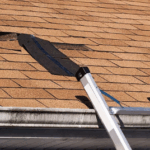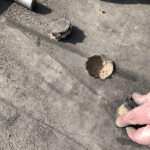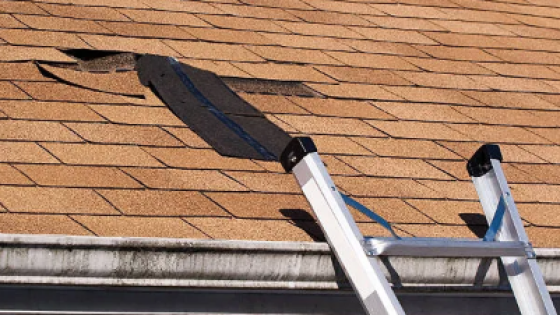Filing an insurance claim for roof damage can be a stressful and complex process, especially when dealing with storm-related issues such as hail, wind, or severe weather that are common in Knoxville, Tennessee.
A roofing contractor plays a pivotal role in ensuring that the process is smooth, efficient, and beneficial for the homeowner.
For Knoxville residents, Litespeed Construction, a trusted name in the roofing industry, offers valuable support when navigating the insurance claim process.

The Importance of Roofing Contractors in Insurance Claims
Roofing contractors are not just there to fix a damaged roof; they are your advocates throughout the insurance claim process. Their expertise and experience allow them to act as liaisons between the homeowner and the insurance company. But how exactly do they assist?
1. Initial Inspection and Damage Assessment
– Thorough Inspection: The first step a roofing contractor takes is conducting a detailed inspection of your roof. This inspection is critical because it identifies not only the obvious damages but also any hidden or future risks. Contractors use various tools, including drones and moisture detection equipment, to assess the full extent of the damage.
– Accurate Documentation: The roofing contractor will document all damages with photographs, videos, and written reports. This information is crucial for proving the scope of the damage to the insurance company. Without professional documentation, homeowners risk having their claims denied or undervalued.
2. Assistance with Filing the Insurance Claim
– Expert Knowledge: Roofing contractors understand the complexities of roofing materials, types of damage, and the overall roofing system. This makes them invaluable when describing and explaining damage to insurance adjusters.
– Claim Filing Support: Many homeowners are unfamiliar with the insurance claim process. A reputable roofing contractor like Litespeed Construction can assist in ensuring that all necessary paperwork is properly filled out and submitted. They can also help you understand the different types of coverage your policy offers and how it applies to roof repair or replacement.
3. Meeting with the Insurance Adjuster
– Contractor-Adjuster Collaboration: After a claim is filed, the insurance company will send an adjuster to assess the damage. Having your roofing contractor present during the adjuster’s inspection is critical. The contractor ensures that the adjuster notices all damage, even those less visible areas that could be overlooked.
– Detailed Explanations: Contractors act as mediators, explaining roofing systems and damage types to adjusters. Without their insight, an adjuster might incorrectly assess the level of damage or suggest repairs that don’t align with industry best practices. For example, your roofing contractor can explain why certain materials must be used or why a partial repair may not be adequate, ensuring you get the proper coverage.
4. Repair Estimates and Supplementary Claims
– Accurate Repair Estimates: A roofing contractor provides an estimate for the work needed to restore the roof to its original condition. They are familiar with local pricing, building codes, and Knoxville’s specific weather-related requirements, ensuring the estimate is both fair and comprehensive.
– Handling Supplements: Often, additional damage is discovered once roof repairs begin. Roofing contractors will work with the insurance company to file supplementary claims to cover any unexpected repairs. This can prevent homeowners from having to pay out of pocket for unforeseen issues.
5. Negotiating the Insurance Settlement
– Expert Negotiation: Insurance companies often attempt to settle claims for less than the actual repair costs. Roofing contractors are skilled at negotiating with insurers, ensuring that the homeowner receives a fair settlement. They advocate for the proper compensation needed to restore the roof fully, preventing lowball offers.
– Ensuring Policy Compliance: A roofing contractor makes sure that the roof repairs or roof replacements required comply with local codes, manufacturer specifications, and the terms of the homeowner’s insurance policy. This compliance ensures that the work is covered and reduces the likelihood of future disputes with the insurer.
6. Completion of Repairs and Follow-up
– Timely Repairs: After the settlement is reached, the roofing contractor will begin the repair or replacement work. They will manage the entire process, from ordering materials to coordinating labor. In addition, they ensure that the work is done efficiently and meets all standards.
– Final Inspection and Warranty: Once repairs are completed, the roofing contractor will perform a final inspection to ensure quality work. They will also provide any warranties associated with the repairs, giving the homeowner peace of mind.
Web Ratings for Litespeed Construction
– Litespeed Construction: 4.8/5
– Yelp: 5/5
– Angie’s List: 4.6/5
– Knoxville Roofing Pro: 4.6/5
– Tennessee Weatherproof: 4.7/5

FAQs About Roofing Contractors and Insurance Claims
A roofing contractor has the expertise to identify hidden damage, document it properly, and ensure that the insurance adjuster accounts for everything. They can also negotiate with the insurance company to ensure you get a fair settlement.
Generally, roof damage caused by storms, hail, wind, and other acts of nature are covered by insurance. Wear and tear or neglect typically are not.
The length of the process can vary, but having a roofing contractor handle much of the work can streamline it, ensuring faster approval.
A roofing contractor can help file an appeal or re-assessment, offering additional documentation and expert testimony.
Yes, but it’s usually in your best interest to involve your insurance to minimize out-of-pocket expenses.
Some roofing contractors charge for detailed inspections or consultations, but most fees are bundled into the cost of the roof repair if you proceed with them.
The roofing contractor will work with the insurance company to file a supplementary claim to cover additional repairs.
It’s a good idea to get a couple of estimates to ensure fairness, but working with a trusted contractor from the start can save time.



























